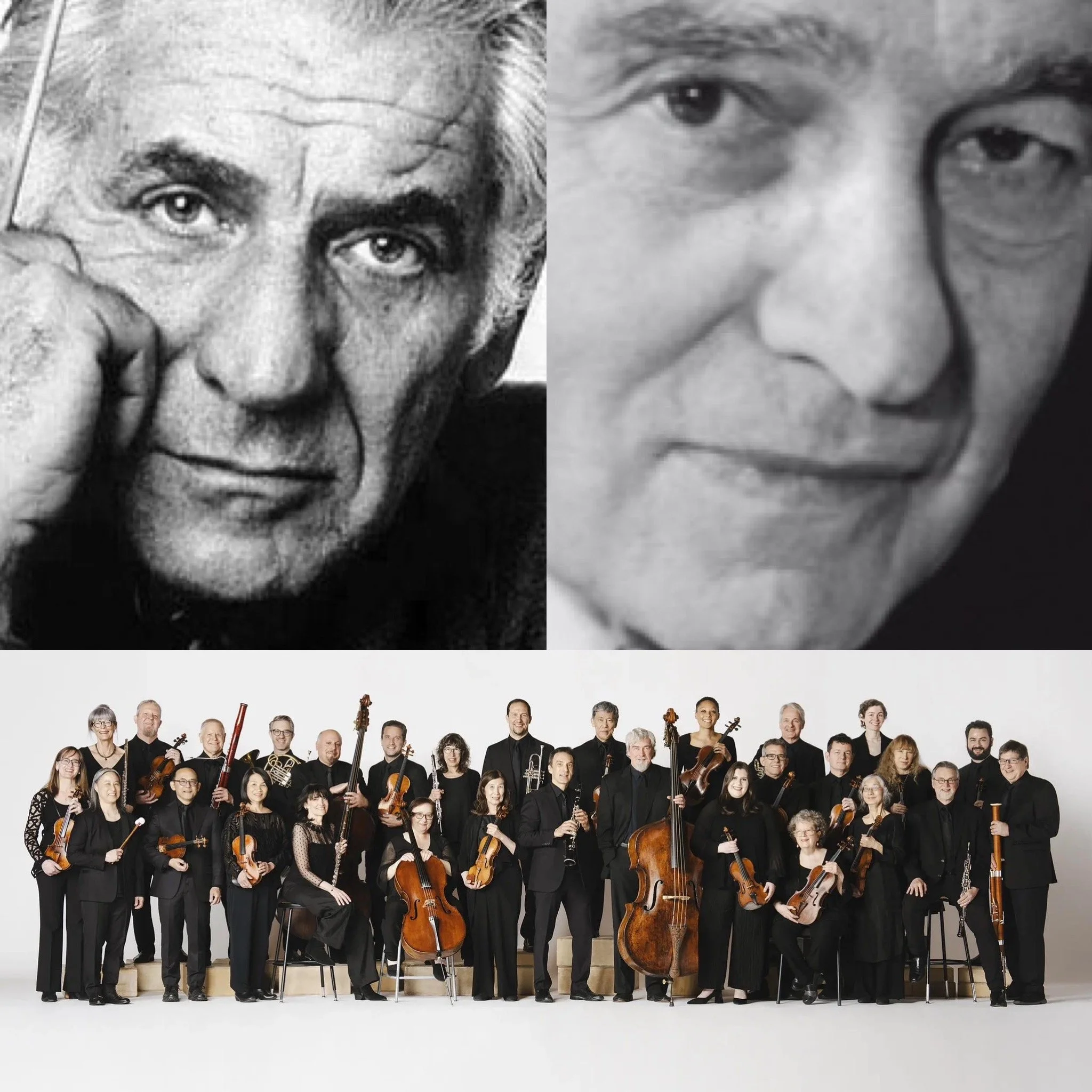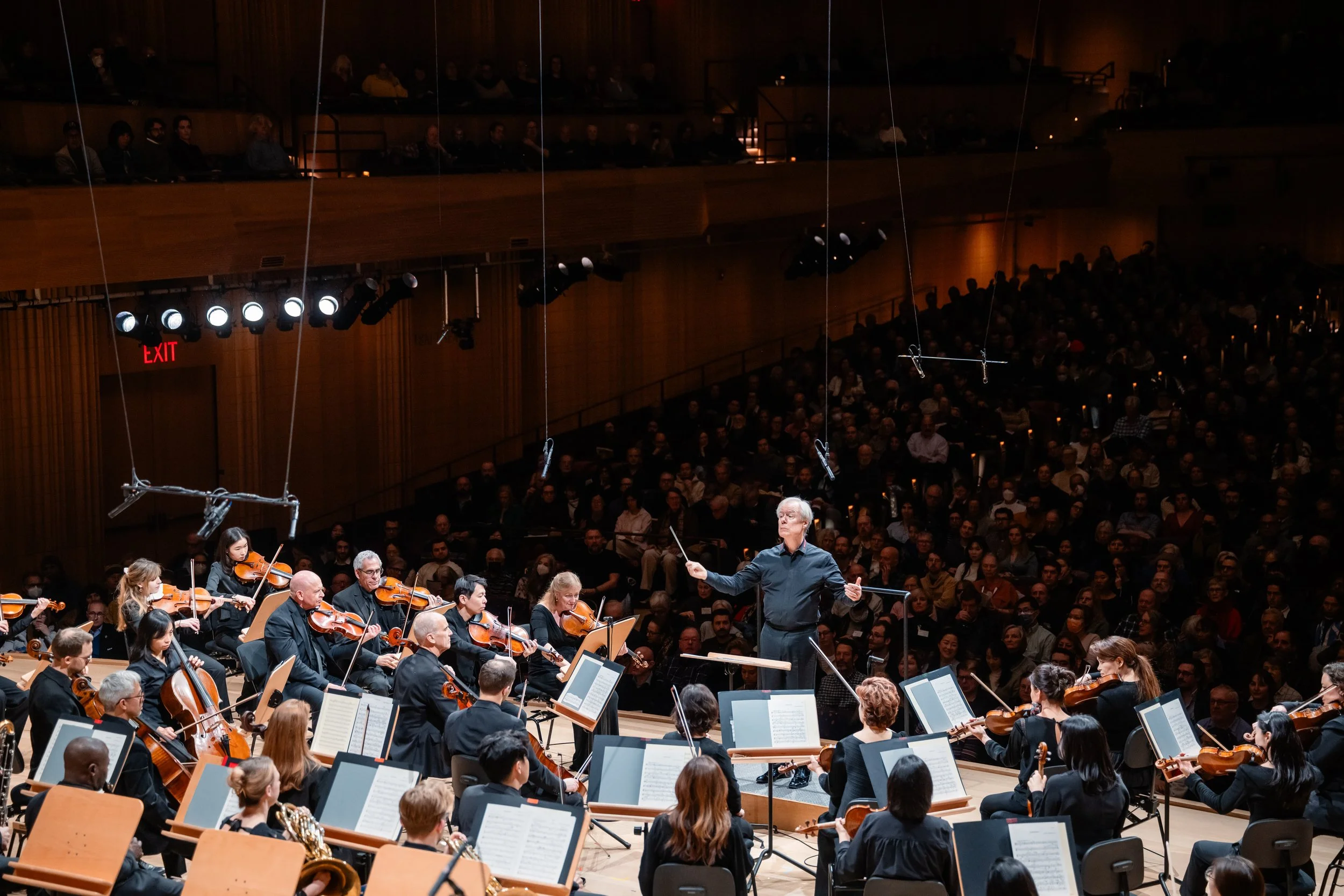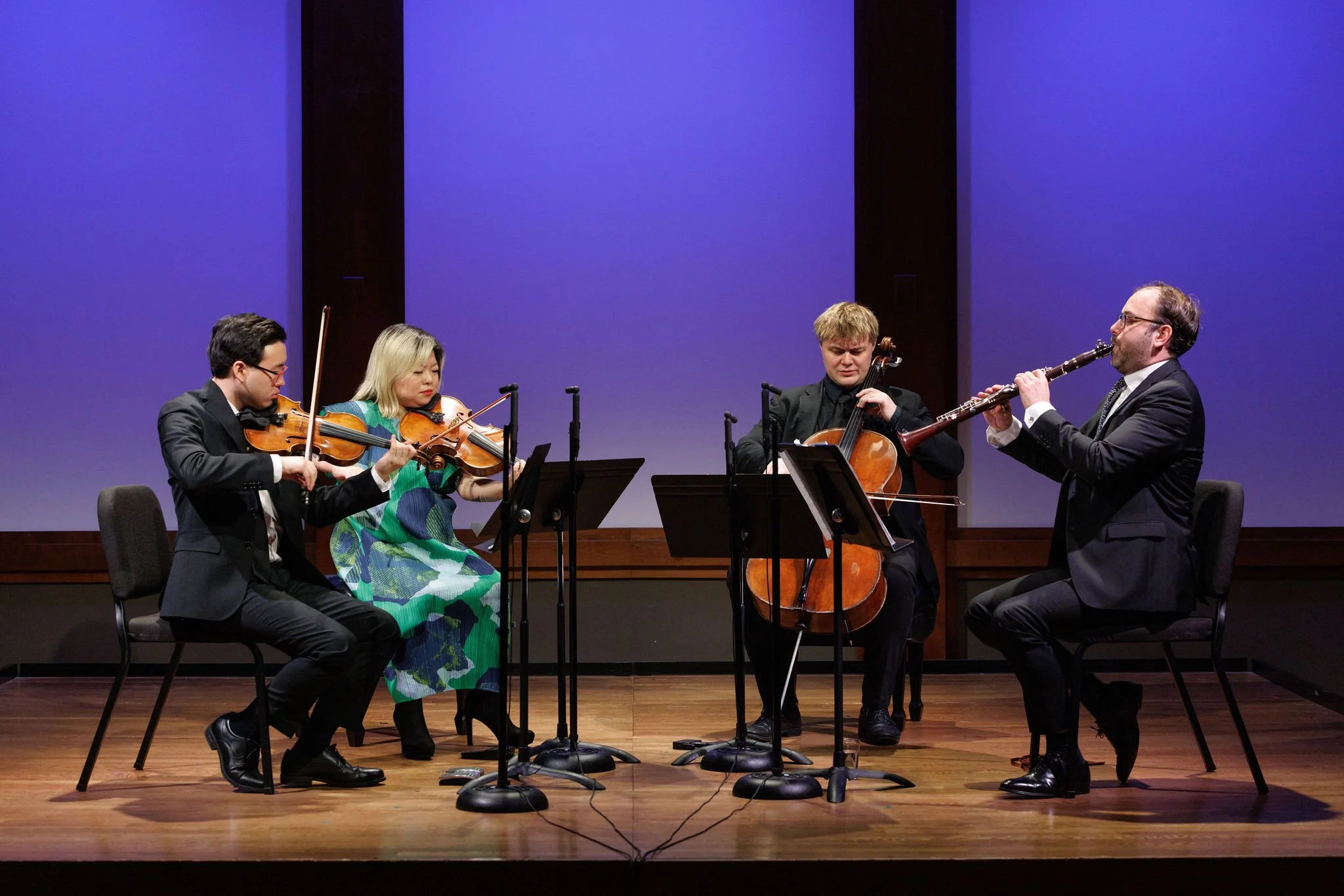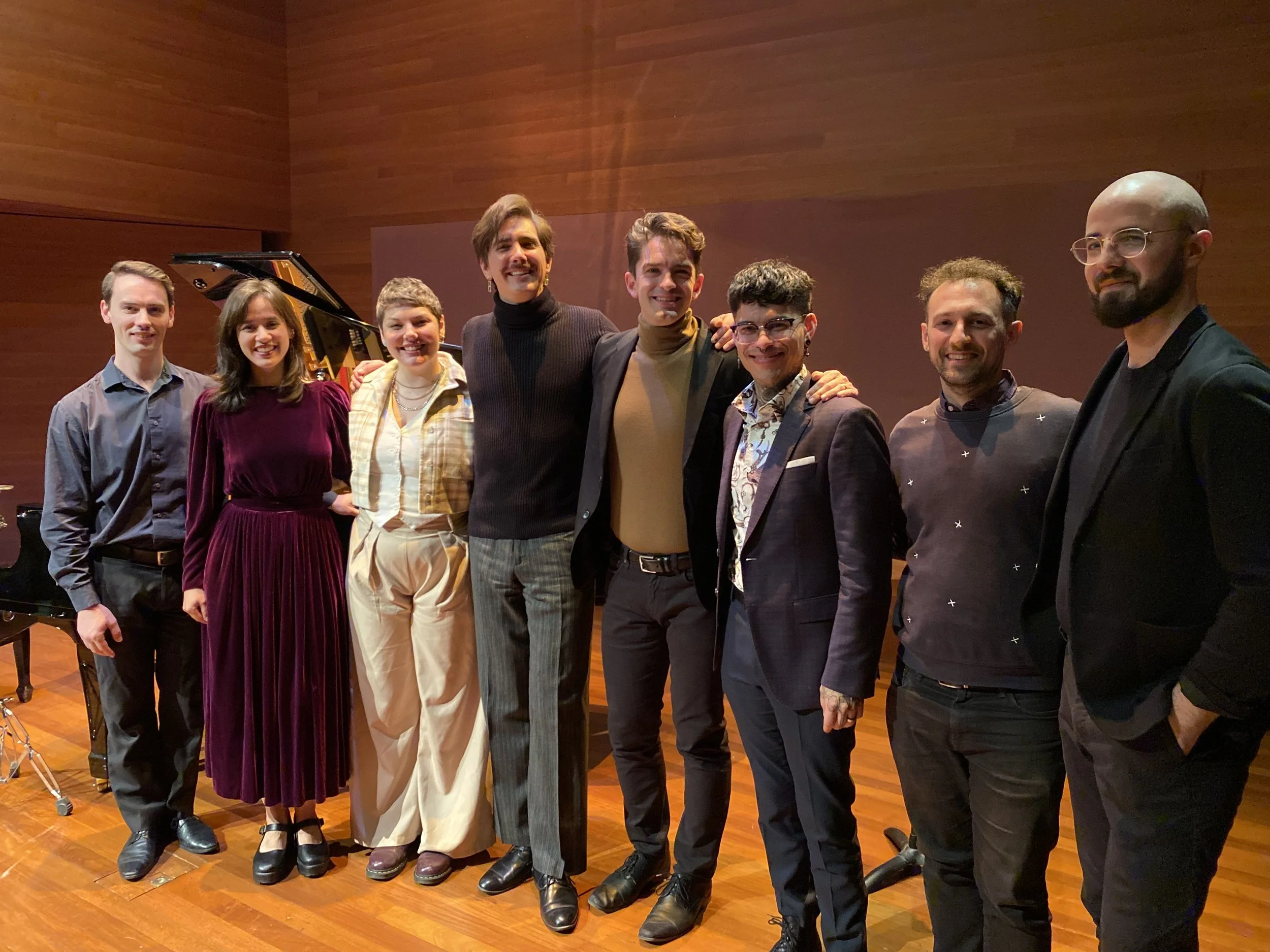Özgür Aydin partnered with Midori at the piano, with sturdy, substantial playing — big and assertive, yet exceedingly pliable. Just the foundational framework from which the Japanese-American virtuoso could inhabit and project a rich, yet balanced selection of German and French music. This was playing — technically and interpretively — that was truly “finished.” Consummate musicianship.
REVIEW: Wang and Olafsson Team Up at Carnegie Hall
The two pianists couldn’t be more different. Wang reads from an iPad; Ólafsson has traditional sheet music and a page turner. But, their disparate sensibilities suited their duet parts, like Apollo and Dionysus — Ólafsson (on secondo, in the bass register) was grounded and detailed, a structural foundation, while Wang, on the primo, was anxious and bursting with spontaneity. The first half continued with three works by American mavericks.
REVIEW: Canellakis Balances Elements and Emotion with NY Phil
New York City native Karina Canellakis, Chief Conductor of the Netherlands Radio Philharmonic Orchestra and Principal Guest Conductor of the London Philharmonic Orchestra, returned to her hometown’s Philharmonic to helm an relentlessly sensuous, yet intriguingly balanced, program of music by twentieth century composers.
REVIEW: Conrad Tao Keys Into Debussy Etudes at Zankel Hall
The audience arrived to find Zankel Hall arranged as a theatre in the round, encircling a concert grand sharing the stage with a Lumatone, a MIDI controller with a keyboard resembling the left box of an accordion (or the Jankó keyboard), illuminated in ethereal pinks and blues, the room splashed with atmospheric lighting effects. Tao is a pianist who functions thrillingly within traditional classical music trappings, but it was no mere gimmick that his solo return to Carnegie Hall brought a downtown sense of avant-garde to midtown. It’s in his soul.
REVIEW: Orchestra of St. Luke's Prays the "Kaddish"
Former Secretary of State Antony Blinken spoke with eloquent gravitas as he introduced the Orchestra of St. Luke’s, and his own mother, in advance of their monumental Carnegie Hall performance of Leonard Bernstein’s Symphony No. 3, “Kaddish,” commemorating the 80th anniversary of the liberation of Auschwitz. James Conlon conducted the sizable forces — large orchestra, chorus, children’s chorus, soprano soloist, and two speakers.
REVIEW: ‘Rug Concert,’ Revived, in NY Phil Tribute to Boulez
The concert’s second half was devoted entirely to twentieth-century music: portions of Boulez’s own 1957 song cycle Pli selon pli were preceded by Anton Webern’s Symphony, Op. 21, and followed by Igor Stravinsky’s L’Histoire du Soldat Concert Suite. The number of players varied; the Stravinsky is a mere septet, and the Boulez piece features just vocalist, harp, keyboards, and percussion. Boulez’s embrace of variety — Bach to himself, Baroque court to mid-century modern — of both period and color palette is instructive.
REVIEW: Bruce Liu Savors Return to Carnegie Hall
Liu tore into the Prokofiev with a lion-like focus, slicing through the thorny exterior — occasionally at the expense of rhythmic definition — to savor the protein beneath. I missed some of the rattling bones and militaristic brass in the first movement, Allegro inquieto, but heard the second movement, Andante caloroso, anew. Liu handled the middle section, in which alternate realities seem to collide, with deft clarity.
REVIEW: Sights and Sounds of Stalin at NY Phil
Dmitri Shostakovich’s Tenth Symphony — a towering journey from darkness and despair to optimism, and a powerful chronicle of toiling under Stalin’s Soviet regime — was the focus of the New York Philharmonic’s impressive turn under the baton of Keri-Lynn Wilson, in her splendid debut with the orchestra. In a programming coup de théâtre, the challenging hour-long symphony completed in 1953 was accompanied by an imaginative film, Oh To Believe in Another World, by renowned South African opera director William Kentridge.
REVIEW: Nimble, Precocious Yunchan Lim With NY Phil
Taking the stage as soloist in Chopin’s Piano Concerto No. 2 in F Minor, Op. 21, Lim emerged from the wings and greeted the audience dutifully, in a stupor— as if he was performing under duress, or sleep-walking. Not emitting so much as blink or a smile, you wouldn’t have predicted the sensuality that would soon drip from his fingers. Accompanied meticulously by Yamada, who juiced as much color out of Chopin’s subtle orchestration as possible, Lim and the Philharmonic gave a stunningly nimble and entertaining account of Chopin’s early showcase for his own talents.
REVIEW: Mäkelä and Royal Concertgebouw Seduce Carnegie Hall
If conducting technique was an Olympic sport, Mäkelä gave a medal-worthy performance. Perhaps the clearest conductor I have ever seen, embodying in equal parts the physicality, and spirit, of the music, he propelled the music’s rhythmic and dynamic energy into orbit, while also infusing it with emotional character. Svelte and debonair — and impeccably tailored — he does so without losing that Stokowski silhouette.
REVIEW: Virtuoso Winds at CMS
Alice Tully Hall was filled to the brim on Sunday for Chamber Music Society of Lincoln Center’s Virtuoso Winds, a jigsaw puzzle with six pieces. Six musicians combined in various duos and a trio, and eventually in a thrilling sextet, intent on the powerful possibilities and the joy of making music.
REVIEW: Adams Conducts Adams at New York Philharmonic
It has been suggested that composers shouldn’t conduct their own music. But, John Adams, whose Antony and Cleopatra will premiere at the Metropolitan Opera in the spring, disproved the theory, leading a thoroughly convincing and brilliantly played evening of mostly American twentieth- and twenty-first century compositions.
REVIEW: Pacifica Quartet's Portrait of America at 92NY
Grammy-winning Pacifica Quartet painted a monumental portrait of the United States in their recent American Snapshots: JFK, Vietnam, and Ellis Island at 92NY, indemnifying music from two of America’s darkest moments — from two of America’s worthiest twentieth century composers, Samuel Barber and George Crumb — with a symbol of its optimism and possibility, Antonín Dvořák’s “American” Quartet.
REVIEW: Mozart Unscathed Despite Erratic Performance
For Orpheus — New York’s 52-year-old democratic chamber orchestra that operates without a conductor — the answer is “no, thank you.” But, Maxim Vengerov, celebrated Soviet-Israeli violin virtuoso engaged as soloist in a two-concert survey of Mozart’s complete works for violin and orchestra at Carnegie Hall, apparently did not get the memo.
REVIEW: Junction Trio’s Impactful Debut at 92NY
The Junction Trio is more than a piano trio. The triad of violinist Stefan Jackiw, cellist Jay Campbell, and pianist Conrad Tao is a juggernaut. The threesome made an impactful debut at 92NY on Friday in a daring gambit, deploying two warhorses of the genre alongside a bit of indignant commentary in the form of a spunky world premiere.
REVIEW: Hummel and Prokofiev in CMS Rose Studio
CMS invites audiences to this petite slice of heaven (the venue seats about a hundred people) for various events, from Inside Chamber Music lectures (with Bruce Adolphe) to concerts and masterclasses. Thursday’s Rose Studio Concert, hosted and curated by oboist James Austin Smith, was an enchanting, hour-long holiday.
REVIEW: NYFOS Makes Space For New Music
An art song recital is the last place remaining for an audience to hear an unamplified singer in an intimate setting; as such, it always has a whiff of the 19th century about it. But NYFOS Next, the venerable New York Festival of Song’s new music series, showed in their recent program “A Space to Make” that the ancient form is alive and very much kicking in the hands of the current generation of practitioners.
REVIEW: Phantasias and Variations - Angela Hewitt Turns Focus To Mozart
Angela Hewitt — esteemed as one of today’s master interpreters of J. S. Bach, having recorded and performed the Baroque master’s complete ouvre for ten fingers to great acclaim in recent years, has embarked on her next chapter, The Mozart Odyssey, a survey of Mozart’s piano concertos around the globe. Hewitt began her latest concert in Kaufman Auditorium at 92NY with Mozart’s Phantasia, beautifully paced and technically graceful, adding her own flare to the written ornaments — as an opera in miniature.



















